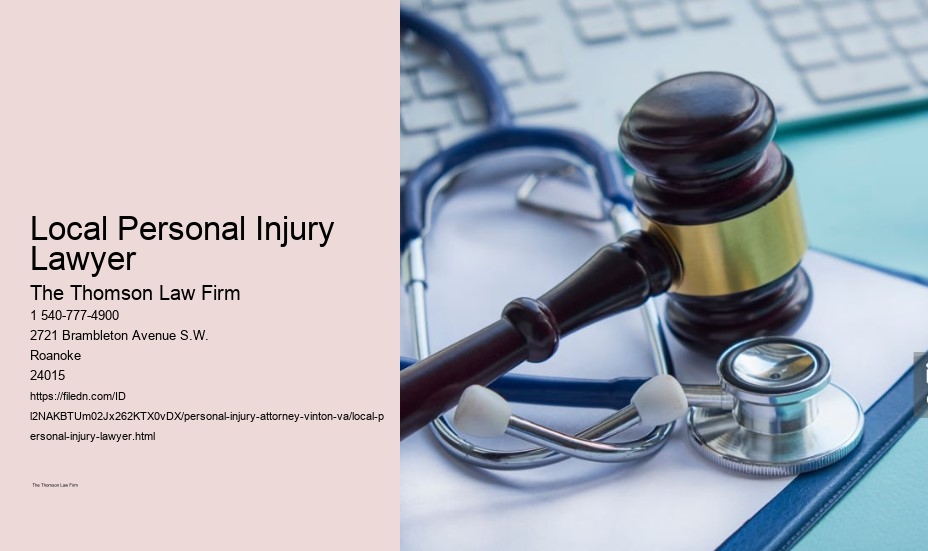

Don’t rush to accept the first settlement offer. It’s often lower than what you deserve. Consult your lawyer to ensure you’re getting fair compensation.
Conclusion
Timing is everything in personal injury claims. From gathering evidence and seeking medical attention to reporting the incident and filing your claim, acting swiftly can make a significant difference. It helps build a strong case, ensures you receive fair compensation, and provides peace of mind. So, if you find yourself injured due to someone else's negligence, remember that time is of the essence—take action immediately to protect your rights and secure the best possible outcome for your claim.
The Financial Burden of Personal Injuries and How Attorneys Can Assist
Introduction
Personal injuries can be a life-altering event, impacting not only your physical health but also your financial stability. Understanding the financial burden associated with personal injuries and knowing how attorneys can assist you in these challenging times is crucial. This article explores the various financial implications of personal injuries and the pivotal role attorneys play in mitigating these costs.
Understanding Personal Injuries
Personal injuries refer to physical or psychological harm caused by the negligence or intentional actions of another party. Read about the best Local Personal Injury Lawyer in Vinton, VA. They can range from minor injuries, like cuts and bruises, to severe injuries, such as spinal cord damage or traumatic brain injuries.
Common Types of Personal Injuries
Personal injuries can occur in various scenarios. Some common types include: Car accidents, Slip and fall incidents, Medical malpractice, Workplace injuries,Product liability cases.
Causes of Personal Injuries
Personal injuries can result from numerous causes, such as: Reckless driving, Unsafe work environments, Defective products, Medical errors, Negligence in maintaining property.
The Financial Impact of Personal Injuries
The aftermath of a personal injury often extends beyond physical pain and emotional distress. The financial repercussions can be overwhelming. Let's break down the main financial burdens associated with personal injuries.
Medical Expenses
Medical bills are often the most immediate and pressing financial concern following a personal injury. These expenses can include emergency room visits, surgeries, hospital stays, medications, physical therapy, and ongoing medical care. The costs can quickly add up, especially if long-term treatment is required.
Loss of Income
If your injury prevents you from working, you may experience a significant loss of income. This can be particularly devastating if you are the primary breadwinner in your family. Loss of income includes not only the immediate loss of wages but also the potential loss of future earnings if the injury leads to a long-term disability.
Long-Term Rehabilitation
CostsSome injuries require extensive rehabilitation, which can span months or even years. Physical therapy, occupational therapy, and other forms of rehabilitation are crucial for recovery but can be very costly.
Emotional and Psychological Costs
The emotional and psychological toll of a personal injury can also lead to financial burdens. Therapy and counseling sessions to address trauma, depression, anxiety, and other mental health issues can be necessary for recovery. These services, however, come with their own set of costs.
The Role of Personal Injury Attorneys
Personal injury attorneys are legal professionals who specialize in cases involving personal injuries. They play a vital role in helping victims navigate the complex legal landscape and secure the compensation they deserve. Here’s how they can assist:
Legal Expertise
Personal injury law is intricate and varies by state. An experienced attorney has the knowledge and expertise to navigate these complexities, ensuring that your case is handled correctly and efficiently.
Negotiation Skills
Insurance companies often aim to minimize payouts. A skilled attorney can negotiate on your behalf to ensure you receive fair compensation for your injuries and losses. They can counter lowball offers and fight for a settlement that truly reflects the extent of your damages.
Support and Guidance
The aftermath of a personal injury can be confusing and stressful. Attorneys provide much-needed support and guidance throughout the legal process, from filing claims to representing you in court if necessary. Their support can make a significant difference in your ability to focus on recovery.
Contingency Fee Basis
Many personal injury attorneys work on a contingency fee basis, meaning they only get paid if you win your case. This arrangement makes legal representation accessible to those who might not afford it otherwise and motivates attorneys to work diligently on your behalf.
Steps to Take After a Personal Injury
Knowing what to do immediately after a personal injury can significantly impact your ability to receive compensation.
Seek Medical Attention
Your health should be your top priority. Seek medical attention immediately, even if your injuries seem minor. A medical professional can assess your condition, provide necessary treatment, and document your injuries, which will be crucial for your case.
Document the Incident
Gather as much information as possible about the incident. Take photos of the scene, collect contact information from witnesses, and keep records of any expenses related to your injury. This documentation can serve as vital evidence in your case.
Contact an Attorney
As soon as possible, consult with a personal injury attorney. They can provide you with the legal advice and representation you need to protect your rights and pursue compensation. The earlier you involve an attorney, the better they can help you build a strong case.
How Attorneys Build a Case
Building a strong personal injury case requires thorough preparation and attention to detail. Here's how attorneys typically approach this process:
Gathering Evidence
Attorneys will collect and review all available evidence, including medical records, police reports, witness statements, and any other documentation related to the incident. This evidence forms the foundation of your case.
Consulting Experts
In some cases, attorneys may consult with experts, such as medical professionals, accident reconstruction specialists, or economists, to strengthen your case. These experts can provide insights and testimony that support your claims.
Calculating Damages
Accurately calculating the full extent of your damages is crucial. Attorneys will consider all aspects, including medical expenses, lost income, pain and suffering, and any future costs related to your injury. This comprehensive calculation ensures that you seek appropriate compensation.
Filing a Lawsuit
If a fair settlement cannot be reached through negotiation, your attorney may recommend filing a lawsuit. This involves formally presenting your case in court and seeking a judicial resolution. Attorneys handle all the legal procedures, filings, and court appearances, allowing you to focus on recovery.
What is your fee structure?
Legal fees can be confusing. Ask for a detailed explanation of their fee structure, including any contingency fees. Knowing this upfront can prevent unpleasant surprises later on.
Are there any upfront costs?
Some attorneys may require upfront costs for certain expenses.
Will I be responsible for any case-related costs if we lose?
It’s crucial to understand your financial obligations if the case doesn’t go in your favor. Ask about any case-related costs you might be responsible for, win or lose.
Case Management
Who will handle my case?
In some firms, the attorney you meet might not be the one handling your case. Make sure you know who will be working on your case and their qualifications.
How accessible are you for questions and updates?
Accessibility is important. Find out how often you can contact your attorney and how quickly they respond to queries. You want to ensure they are available when you need them.
Timeline and Expectations
How long do you expect my case to take?
Legal proceedings can be lengthy. Ask for an estimated timeline for your case. This will help you manage your expectations and plan accordingly.
What are the possible outcomes of my case?
Understanding the potential outcomes can help you prepare for any scenario. Discuss the best and worst-case scenarios with your attorney.
Additional Questions
What should I avoid doing during my case?
Certain actions can jeopardize your case. Ask your attorney for advice on what to avoid to ensure you don’t unintentionally harm your chances.
What can I do to strengthen my case?
There are often steps you can take to bolster your case. Your attorney can provide guidance on what actions you can take to help ensure a favorable outcome.
Conclusion
Choosing the right personal injury attorney is a critical step in your legal journey. By asking these key questions, you can ensure you select an attorney who is experienced, communicative, and aligned with your goals. Remember, the right attorney will not only fight for your rights but will also support you throughout the process.
The Ethics of Personal Injury Law: What You Need to Know
Introduction
Personal injury law is a field that often finds itself in the spotlight, not just for the high-profile cases but also for the ethical questions it raises. Whether you're a potential client or an aspiring lawyer, understanding the ethics of personal injury law is crucial. Let's dive into what you need to know about the ethical landscape of this legal area.
Understanding Personal Injury Law
Definition and Scope
Personal injury law, also known as tort law, deals with cases where an individual's body, mind, or emotions are hurt, typically due to someone else's negligence or carelessness. The scope of this law is vast, covering everything from car accidents to medical malpractice and workplace injuries.
Common Types of Personal Injury Cases
Common cases in personal injury law include car accidents, slip and fall incidents, medical malpractice, product liability, and workplace injuries. Each of these cases requires a unique approach and understanding, which is why specialization in this field is so prevalent.
The Role of Ethics in Law
What Are Legal Ethics?
Legal ethics are the principles and standards that guide the behavior and decision-making processes of lawyers and legal professionals. They ensure that justice is served while maintaining the integrity of the legal profession.
Why Ethics Matter in Personal Injury Law
Ethics in personal injury law are particularly important because these cases often involve vulnerable individuals who need trustworthy representation. Unethical practices can lead to injustice, exploitation, and a loss of trust in the legal system.
Key Ethical Considerations
Attorney-Client Relationship
Confidentiality
One of the cornerstones of legal ethics is confidentiality. Lawyers must protect their clients' private information and not disclose any details without consent. This trust is fundamental to the attorney-client relationship.
Informed Consent
Informed consent means that clients are fully aware of and understand the potential outcomes of their case and the legal strategies employed. Lawyers must communicate clearly and ensure their clients are making informed decisions.
Conflict of Interest
Lawyers must avoid situations where their interests conflict with those of their clients. This includes not representing multiple clients with opposing interests in the same case. Maintaining impartiality is key to upholding ethical standards.
Contingency Fees and Fairness
Contingency fees are common in personal injury cases, meaning lawyers get paid only if the client wins. While this can make legal services more accessible, it's important that fees are fair and transparent to avoid exploitation.
Ethical Challenges in Personal Injury Law
Misleading Advertising
Some law firms may engage in misleading advertising, promising more than they can deliver. Ethical guidelines require honest communication about what clients can realistically expect.
Ambulance Chasing


Ambulance chasing refers to lawyers who actively seek out accident victims to offer their services, often in an aggressive or intrusive manner. This practice is not only unethical but also illegal in many jurisdictions.
Overzealous Representation
While lawyers should advocate zealously for their clients, there is a fine line between passionate representation and unethical behavior. Lawyers must balance assertiveness with honesty and respect for the law.
Maintaining Professional Integrity
Continuing Legal Education
Lawyers must stay updated with the latest developments in the law and ethical standards. Continuing legal education helps ensure they can provide competent and ethical representation.
Accountability and Discipline
There are mechanisms in place to hold lawyers accountable for unethical behavior, including disciplinary actions by bar associations. This accountability helps maintain public trust in the legal profession.
Conclusion
Ethics in personal injury law are not just about following rules but about fostering trust and ensuring justice. Lawyers must navigate complex ethical landscapes to advocate effectively for their clients while maintaining the integrity of the legal system. Understanding these ethical considerations can help clients choose the right representation and help lawyers provide the best service possible.
The Difference Between Settlement and Trial in Personal Injury Cases
Introduction
Navigating a personal injury case can feel like being lost in a maze. The legal jargon, the endless paperwork, and the crucial decisions can be overwhelming. One of the most significant choices you'll face is whether to settle your case or take it to trial. Each path has its twists and turns, and understanding them can make a world of difference in your journey to justice.
Understanding Personal Injury Cases
Personal injury cases arise when someone suffers harm due to another's negligence or intentional conduct. These cases encompass a wide range of incidents, from car accidents to medical malpractice. The ultimate goal is to seek compensation for the damages suffered, which can be achieved either through a settlement or a trial.
What is a Settlement?
A settlement is an agreement reached between the injured party (plaintiff) and the party responsible for the injury (defendant), often with the help of their insurance company. Instead of going to court, both parties agree on a compensation amount that the defendant will pay to the plaintiff.
Types of Settlements
Settlements can be structured in different ways to meet the needs of both parties.
Lump-Sum Settlements
This type of settlement involves a one-time payment to the plaintiff. It provides immediate access to funds, which can be beneficial for covering immediate expenses.
Structured Settlements
Here, the compensation is paid out over time in regular installments. This can offer long-term financial security and is often used in cases where the plaintiff has ongoing medical needs.
What is a Trial?
A trial is a formal judicial proceeding where the case is presented before a judge and, often, a jury. Both parties present their evidence and arguments, and the judge or jury makes a decision on the outcome.
The Trial Process
The trial process is more complex and formal compared to a settlement. It involves several stages.
Pre-Trial Procedures
This includes the filing of complaints, discovery (exchange of evidence), and pre-trial motions. These steps can be lengthy and require meticulous preparation.
The Trial Itself
During the trial, both sides present their cases through opening statements, witness testimonies, cross-examinations, and closing arguments. The judge or jury then deliberates and renders a verdict.
Post-Trial Procedures
After the trial, there might be post-trial motions and possibly an appeal if one party is dissatisfied with the verdict. This can extend the duration of the case further.
Key Differences Between Settlement and Trial
Settlements and trials differ significantly in various aspects, each with its unique implications.
Time and Duration
Settlements are generally quicker, often resolved within months. Trials, on the other hand, can take years, considering the preparation, court schedules, and potential appeals.
Costs Involved
Trials are usually more expensive due to legal fees, expert witness fees, and other court-related expenses.
Control and Predictability
Settlements offer more control and predictability as both parties agree on the terms. Trials are unpredictable, with the outcome in the hands of the judge or jury.
Privacy Considerations
Settlements are typically private, with the details not disclosed publicly. Trials are public records, meaning anyone can access the case details.
Emotional Impact
Trials can be emotionally draining, involving public scrutiny and reliving the traumatic event. Settlements, while still stressful, are less confrontational and allow for a quicker resolution.
Pros and Cons of Settlements
Settlements can provide a quicker resolution and more control over the outcome. However, the compensation might be lower than what could potentially be awarded in a trial.
Pros and Cons of Trials
Trials can result in higher compensation if the verdict is in the plaintiff's favor. But they are time-consuming, expensive, and emotionally taxing. The uncertainty of the outcome is also a significant drawback.
Factors to Consider When Choosing Between Settlement and Trial

A personal injury attorney is a legal professional who provides representation to individuals who have been injured physically or psychologically due to the negligence or wrongdoing of another party. These attorneys specialize in tort law, which covers civil wrongs and damages.
Yes, hiring a personal injury attorney is often worth it. An attorney's expertise can lead to a higher settlement than you might achieve on your own. They handle the legalities, negotiate with insurance companies, and ensure your rights are protected throughout the process.
Yes, personal injury attorneys at Thomson Law Firm handle medical malpractice cases. If you have been harmed due to a healthcare provider's negligence, we can help you pursue a claim for compensation.
Communication frequency can vary, but a good personal injury attorney should provide regular updates on your case's progress. At Thomson Law Firm, we believe in keeping our clients informed and are always available to answer questions and address concerns.
To find a good personal injury attorney in Vinton, VA, seek recommendations from friends, family, or online reviews. Research attorneys' backgrounds, check their credentials, and schedule consultations to discuss your case and gauge their suitability for your needs.